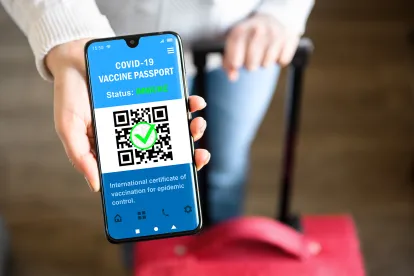To advance the safe resumption of global travel during the COVID-19 pandemic, on Oct. 25 President Biden issued a Proclamation emphasizing the continued enhanced measures against the spread of the virus. The Proclamation quotes data indicating that the most effective way to control the spread amongst international travelers is to get vaccinated, in addition to other measures such as mask-wearing.
As reported on this blog on Sept. 21, the president relaxed travel restrictions for foreign nationals traveling from China, Iran, the Schengen Area, the U.K., Brazil, Ireland, South Africa, and India, and imposed new travel requirements for travelers from all other countries.
When are the travel restrictions lifted?
The Proclamation applies to all travelers aboard flights scheduled to arrive in the United States that depart after 12:01 a.m. EST on Nov. 8, 2021.
What are the new travel requirements?
All adults ages 18 and over traveling on non-immigrant visas such as ESTA, B-1/B-2, L-1, E-2, H-1B, E-3, and correlating dependent visas, must provide proof of vaccination and proof of a negative COVID-19 test taken within three days of boarding their flight to the United States.
Who is exempt?
-
Certain diplomatic visa holders;
-
Foreign nationals who are too old or too young to obtain the vaccine, as determined by the CDC;
-
Foreign nationals participating in certain clinical trials for COVID-19 vaccination, as determined by the CDC;
-
Foreign nationals who, for health reasons, are unable to get the vaccine, as determined by the CDC;
-
Foreign nationals who have been granted an exception by the CDC for humanitarian or emergency reasons;
-
Foreign nationals from countries where the availability of the vaccine is limited (i.e., less than 10% of the population is fully vaccinated), and who are seeking to enter the United States on a nonimmigrant visa (except for B-1/B-2 visas);
-
Foreign nationals who are members of the U.S. Armed Forces, or foreign nationals who are the spouse/child of a member of the U.S. Armed Forces;
-
Foreign nationals seeking entry as a sea crew member; and/or
-
Foreign nationals whose entry would be in the U.S. national interest.
The CDC has been directed to provide specifics for the exceptions above, and to specify the acceptable vaccines or combinations of vaccines and acceptable evidence to prove that an individual is fully vaccinated. There will also be additional requirements for those who are unvaccinated and can still enter the United States, including a requirement to be vaccinated within 60 days upon arrival.
What are the acceptable vaccines?
The Proclamation defers to the CDC’s guidance on acceptable vaccines, which include:
-
Janssen/J&J
-
Pfizer-BioNTech
-
Moderna
-
AstraZeneca
-
Covishield
-
BIBP/Sinopharm
-
Sinovac (available in Asia)
What is considered acceptable proof of vaccination?
Again, the Biden administration defers to the CDC’s list of acceptable proof of vaccination including:
-
Personal identifiers (at a minimum, full name and date of birth) that match the personal identifiers on the passenger’s passport or other travel documents
-
Name of official source issuing the record (e.g., public health agency, government agency, or other authorized vaccine provider)
-
Vaccine manufacturer and date(s) of vaccination
How will this affect visa processing at the U.S. consulates abroad?
The Proclamation states that this only refers to international air travel to the United States and does not affect visa issuance, but that the U.S. State Department can continue to process visa applications without the National Interest Exception. The U.S. State Department issued a statement reiterating that embassies and consulates will not necessarily be able to issue U.S. visas more quickly. This has been an issue throughout the pandemic; how visa issuance is affected with the new vaccine travel requirements remains to be seen.
What about travel from Canada and Mexico?
The Department of Homeland Security announced Oct. 12 that modifications to the Canada and Mexico travel restrictions will be implemented in two phases over the next few months. The first phase, to begin in early November, will allow fully vaccinated travelers (with valid paperwork proving vaccination status) from Mexico or Canada to enter the United States at land and ferry ports of entry for non-essential reasons. The second phase, starting in January 2022, will require all travelers crossing the land or ferry POEs (for essential or non-essential reasons) to be fully vaccinated.



 />i
/>i

